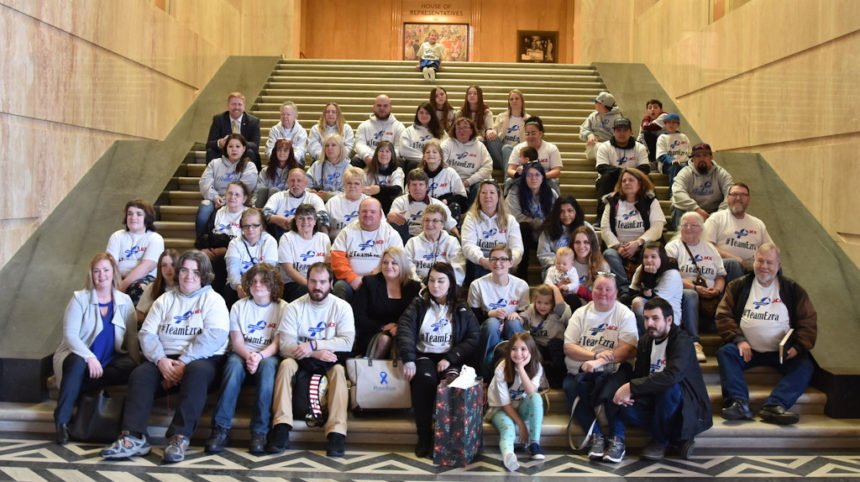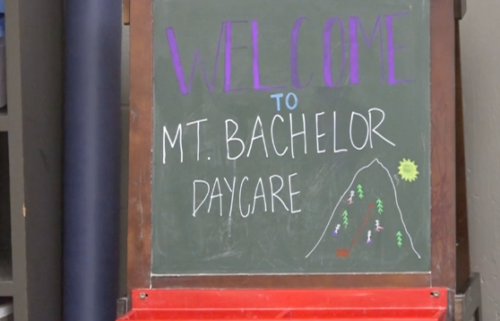‘Ezra’s Law’ stalls in short session, despite dramatic hearing testimony

'Steep climb' for short session, but 'Team Ezra,' all involved commit to 2021 effort
SALEM, Ore. (KTVZ) -- A packed hearing room full of supporters braved the long drive and challenging road conditions Monday to join Rep. Daniel Bonham (R-The Dalles), Jefferson County District Attorney Steven Leriche, Marion County District Attorney Katie Suver and Tina Jorgensen for the introduction of "Ezra’s Law."
House Bill 4122, announced at a Madras event last month, would enable prosecutors to pursue stricter sentencing for criminals who assault and incapacitate victims in ways which decrease their long-term quality of life.
Together, "Team Ezra" offered their unwavering support for the legislation, on the grounds that current sentencing procedures are not suitably severe for offenders who rob youths of their long-term health.
Tina Jorgensen, the grandmother of Ezra Jerome Thomas, the now 4-year-old namesake of HB 4122, testified.
“I was going to be able to cherish graduations, proms and even look forward to him getting married and building a family of his own someday,” Jorgensen shared. “He had a whole life ahead of him. I had a life of grandma moments to share with him. Sadly, my hopes and dreams for Ezra’s future were taken away on November 19, 2017. Before that date, I lived a normal life. Every ounce of joy was taken from me that day.”
Ezra is a 4-year-old who was attacked in 2017 by Josue Jair Mendoza-Melo when he was just 2 years old. Today, Ezra requires 24/7 care and can do almost nothing on his own. Ezra has tracheal and feeding tubes, and a programmable shunt to keep fluid from building up in his brain. He’s legally blind and has had one to three seizures per hour.
Jorgensen, who gave up her career as a bank manager to care for Ezra, noted that the boy has been flown to the hospital six times in the past two years
"I wanted to bring Ezra here today for you to meet him," Jorgensen told lawmakers. "However, Ezra has seizures that are about one to two an hour. And over the past few weeks, they've increased to approximately 10 to 12 an hour. And with the stress of driving and the fear of cold and flu season, it was too risky for us to bring him today."
Leriche said, “The frustration of difficult conversations with victims created the birth of Ezra’s Law,” which he said "will serve to protect those who cannot protect themselves, and as a deterrent against assaulting the innocence of youth”
Josue Jair Mendoza-Melo was sentenced to 12 years for his crime.
As Bonham declared, “Nobody in this building can change the past. No one can understand the grief that comes from a judicial system that is unable to provide closure. We’re here today so that future victims get the justice that they deserve. Ezra, Jessica, Little Roy and countless other victims are having their voices heard today.”
Bonham made Ezra's Law one of his two priorities for the 2020 "short session" after having been inspired by the stories he heard from Jorgensen, Leriche and Crook County District Attorney Wade Whiting.
“While I am disappointed that the Legislature couldn’t take swift action in moving Ezra‘s Law during a short session, I’m optimistic to see all of the momentum that is building behind this cause," Bonham said. "Giving an opportunity for the voices to be heard and creating a work group for all the stakeholders to be at the table working will create a policy that we can all be proud of.”
The lawmaker and others said Ezra’s Law highlights a tragic loophole in the law where sentencing in cases involving severe quality of life loss aren’t proportional to the sentencing options for district attorneys.
HB 4122 would establish a procedure for charging an aggravated version of certain assault and attempted murder offenses when the defendant causes permanent physical injury to victim during commission of crime. If he or she is convicted of an aggravated offense, the court shall sentence the defendant to a minimum 25 years in prison.
Bonham concluded, “It’s easy to get caught up in the sadness of the past, but to see the joy on the faces of victim and their families as they were finally given a 'day in court' and an opportunity for real justice, it’s truly one of the highlights of my session. If reelected, I will continue fighting for justice for Ezra and his family.”
Dylan Amo, Bonham’s chief of staff, said the hurdles of a short session were made more difficult by a new committee chairwoman less than two weeks before the session began. He noted that the tight deadlines require all bills to be scheduled for a work session by the first Friday “so most of the legwork has to be done before the session.
“It was a steep climb, to introduce a complicated subject like sentencing reform” in such a tight timeframe, Amo said. “We are grateful for the outcome, which is a workgroup for victims to share their stories” and to draw in even more stakeholders.
“We’re going to sit down this summer with the workgroup and come up with something even better than we have today,” Amo said, adding that several more lawmakers “have come up to me and talked to me about wanting to be part of” the legislation, which already had bipartisan support.



